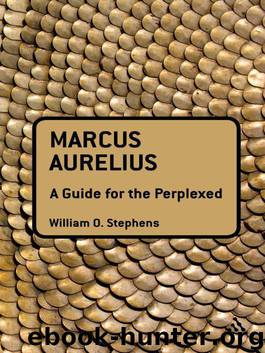Marcus Aurelius: A Guide for the Perplexed by William O. Stephens

Author:William O. Stephens [Stephens, William O.]
Language: eng
Format: epub
ISBN: 9781441108104
Publisher: Continuum UK
THE BEES AND THE HIVE
Marcus believes that the source of good and bad for rational and political beings lies in actively doing, not in being acted upon. Goodness and badness for us is found not in what others do to us, but in what we do, in our own doing (ix. 16). We will examine the kind of activity that goodness consists in for rational, political beings in a few pages. But first, what is the source of bad for rational and political beings? Badness is what harms.
Now if, on Marcus’ view, a human being is an organic part of the whole of humanity, then what does he understand political harm to be? What harms a citizen of a city? Marcus insists that nothing can harm a citizen except what harms the city she belongs to. Only what harms the whole—the city—can harm its part—the citizen. Yet nothing harms the city except what harms its law. Furthermore, Marcus believes, no so-called misfortune can harm the city’s law. No storm, flood, drought, fire, famine, or plague can harm the law. Marcus concludes that as long as the law is safe, the city will be too. And as long as the city as a whole is safe, each of its citizens, each of its parts, will be too (x. 33). The fallacy of division again appears to mar this reasoning. Yet Marcus believes that if an act does not harm the community, then it does not harm the members of the community. Consequently, when he thinks that he has been injured, he reminds himself to apply this rule: If the community isn’t injured by the deed, then neither is he (v. 22).
What if the community has been injured by an offense? In that case, “what injures the hive injures the bees” (vi. 54). What injures the community as a whole injures the individual citizens. Injustice injures the community, and thereby the citizens. So, what should a citizen do about an unjust, injurious offense against the community, say, for example, poisoning its water supply? Marcus insists that retaliation is inappropriate. Vindictiveness is not the right response. If the community is injured by someone, anger is not the answer. Instead, one must show the offender where he went wrong (v. 22). Anger does not correct a wrongdoer. Learning better through proper instruction does. Injustice results from ignorance.
Thought and reason, after all, are things we share with the offender. Reason is what tells both us what to do and what not to do and what tells all other reasoning beings, including the offender, what to do and what not to do. Our shared reason makes the offender and all others fellow citizens of the rational community. This rational community extends beyond the particular city in which we live. It extends beyond the state too. Indeed, the community of rational beings is as large as the entire world. All of humanity, therefore, belongs to the entire cosmos as its citizens. This is the Stoic idea of cosmopolitanism.
Download
This site does not store any files on its server. We only index and link to content provided by other sites. Please contact the content providers to delete copyright contents if any and email us, we'll remove relevant links or contents immediately.
4 3 2 1: A Novel by Paul Auster(12393)
The handmaid's tale by Margaret Atwood(7764)
Giovanni's Room by James Baldwin(7346)
Asking the Right Questions: A Guide to Critical Thinking by M. Neil Browne & Stuart M. Keeley(5775)
Big Magic: Creative Living Beyond Fear by Elizabeth Gilbert(5772)
Ego Is the Enemy by Ryan Holiday(5450)
The Body: A Guide for Occupants by Bill Bryson(5097)
On Writing A Memoir of the Craft by Stephen King(4944)
Ken Follett - World without end by Ken Follett(4732)
Adulting by Kelly Williams Brown(4574)
Bluets by Maggie Nelson(4556)
Eat That Frog! by Brian Tracy(4540)
Guilty Pleasures by Laurell K Hamilton(4449)
The Poetry of Pablo Neruda by Pablo Neruda(4109)
Alive: The Story of the Andes Survivors by Piers Paul Read(4033)
White Noise - A Novel by Don DeLillo(4010)
Fingerprints of the Gods by Graham Hancock(4004)
The Book of Joy by Dalai Lama(3986)
The Bookshop by Penelope Fitzgerald(3853)
